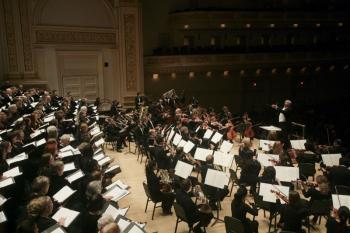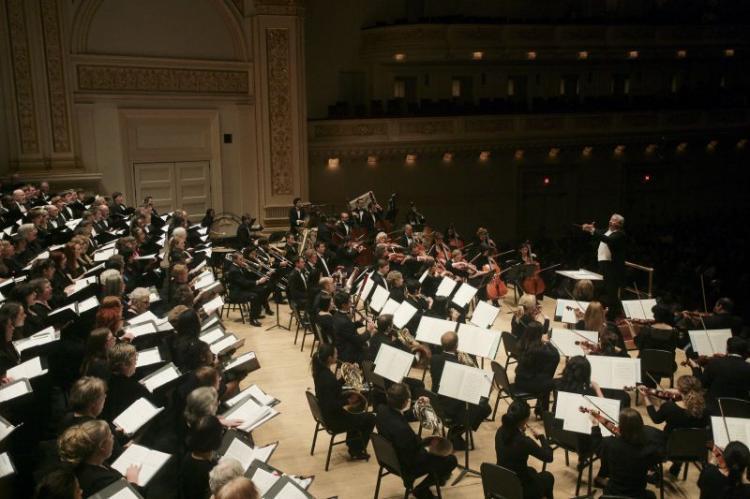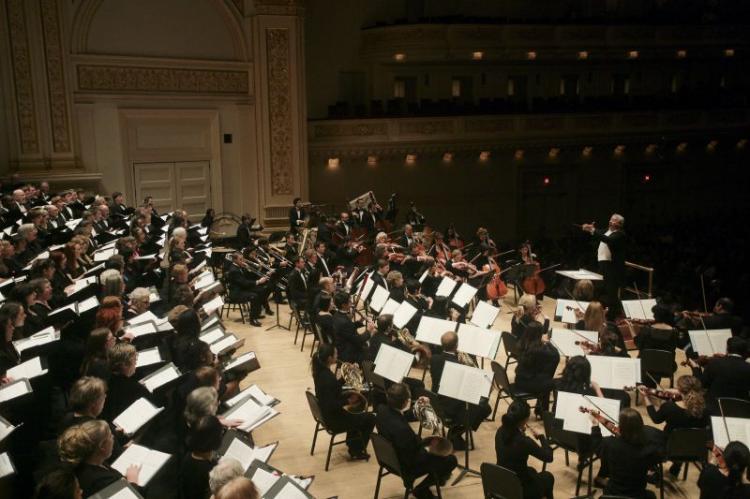With a widely recognized composer like Karl Jenkins, many may be familiar with his music. But it is when they hear a live performance of his work that they truly begin to appreciate his honesty and incredible ingenuity as an artist, and the ambition with which he approaches his craft.
Both “Gloria” and “Stabat Mater,” presented on Jan. 17 at a concert in commemoration of Dr. Martin Luther King Jr. at Carnegie Hall, were part of Jenkins’s project to set iconic Christian religious texts alongside non-Western ones in order to “embrace all cultures” and “their concept of the divine,” Jenkins said in an interview.
Indeed, both pieces are a wondrous blend of enchanting music and heavenly voices, colored by the unique timbre of ethnic instruments that, together, take the listener on a journey to “a spiritual world beyond us,” as Jenkins remarked on the inspiration for composing “Gloria.”
It is this profound conviction in the existence of divinity that we can feel within every note and every breath, captivating and transporting the listener. There is more to what first meets the ear, if one is willing to listen closely. Oftentimes, I felt the urge to close my eyes in order to fully engage on an emotional level with the music. Perhaps this is the reason behind Jenkins’s immense popularity, and the audience’s fervent applause and standing ovations on the night of the Carnegie Hall concert.
A Celebration for Peace
The first program was the American premiere of “Gloria,” which began with a majestic and stately air. As a Christian Mass hymn of praise, “Gloria” is appropriately both powerful and serene, a tribute to the great authority of the divine being, but also his glorious acts on earth. The orchestra featured superb playing throughout the concert, but in “Gloria,” the concertmaster in the “The Prayer“ (second movement) and the flutist in “The Song” (fourth movement) provided an excellent complement to the soft melodies of the voices.
Between movements, passages from the Bhagavad Gita, Diamond Sutra, Tao Te Ching, and Quran were recited as part of Jenkins’ wish to include other cultures’ perception of the divine, but on stage, it was difficult to accommodate for the transition between song and spoken word, making for an awkward performance. Nonetheless, for the audience, it must have been a thrilling experience to listen to the beautiful, unfamiliar sounds of various languages, free from our interpretation of its semantics.
“Stabat Mater” was by far the more compelling piece, both in terms of Jenkins’s composition and the performance. Originally a 13th-century Latin hymn, it describes the Virgin Mary’s suffering at the crucifixion of Jesus Christ. The first movement (“Cantus Lacrimosus”) set the tone for grief and consolation, with the male voices adding a rich tonal depth to the main theme sung by the female voices.
The second movement, “Incantation,” featured ethnic vocalist Belinda Sykes playing a Middle Eastern double-reed woodwind instrument called the duduk, or mey. The instrument and her voice carried a mysterious and eerie quality that was at the same time heartrendingly painful. She sounded like she was crying, deep sorrow ever present in her voice.
Particularly in the fourth movement, “Lament,” Sykes and featured singer Charlotte Daw Paulsen’s vocals evoked a true sense of loss and despair. When the chorus finally joined them, all the voices came together in a powerful testament to our universal experience of grief.
While Paulsen’s rich mezzo-soprano voice shone in “Stabat Mater,” it did not seem to fit well with the soothing melodies in “Gloria.” One wonders if a singer with a higher range, like soprano Hayley Westenra, who did the vocals on the “Gloria” CD recording, would have been more appropriate.
A Composer’s Touch
Without a doubt, the most remarkable characteristic of “Stabat Mater” is Jenkins’s ability to create poignant, powerful renderings of the religious texts.
In “Sancta Mater” (fifth movement), which is a plea to the Holy Mother to let us stand with her in suffering, the horns and strings set a dark mood of impending danger, as if the worse is yet to come.
Then, in “And the Mother Did Weep"(seventh movement), the voices soared in harmony to the same phrase in English, Hebrew, Latin, Aramaic, and Greek, a sound so beautifully tragic the listener is moved to the brink of tears.
Derived from “The Epic of Gilgamesh,” “Are You Lost Out in Darkness?” (ninth movement) tells us there is no hope in sight, as the chorus sings, “Are you lost out in the darkness? Is your sleep, your silence, endless? Can you no more hear my voice?” in both English and Aramaic.
But by the next movement, “Ave Verum,” the music took a lighter turn, singing praise for Jesus’s great deed of sacrifice for mankind. The words were a calling to Christ, but “Ave Verum” was also a prayer—our prayer—to the ones we have lost.
The final movement (“Paradisi Gloria”) culminated in a grand, sweeping number that built up to a climax at the very last note, reminding us that the good will prevail in the end. Some of the Latin text translates to: “Lest I burn in flames enkindled … when my body perishes, grant that my soul be given the glory of Paradise.”
“Stabat Mater” covers a great breadth of emotion within its 12 movements. Owing to Jenkins’s great passion and sensibility, it was able to successfully capture all the complexities of human experience and connect emotionally with listeners at the same time. From interviewing Jenkins, I also understood, from his humble words and actions, that he truly understood what he was writing.
For the Future
Fans of Jenkins will not be disappointed this year, as the prolific composer will have a new album set to “poems and sayings to do with peace” released later this year.
Jenkins’s works will continue to be performed worldwide, including at festivals and concerts in Quebec and Ireland. In the United States, Jenkins will be conducting a performance of “The Armed Man: A Mass For Peace,” his most performed work to date, on the tenth anniversary of 9/11 at Avery Fisher Hall in New York.








